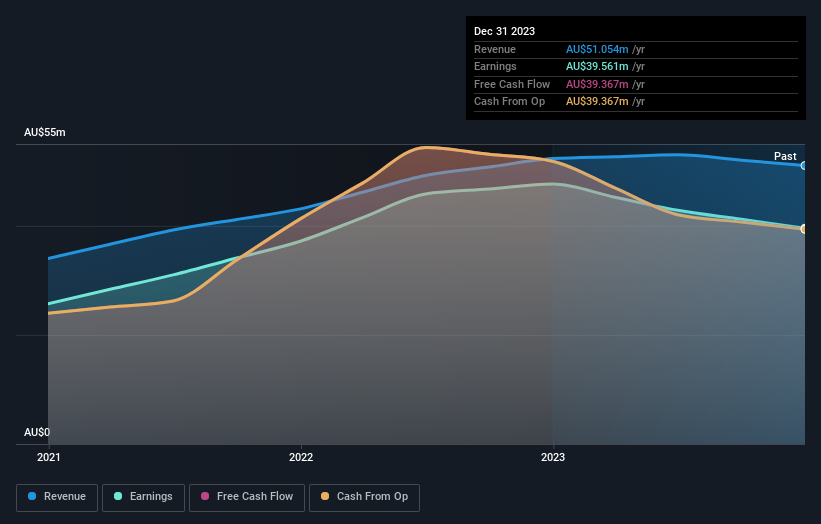Diversified United Investment Limited's (ASX:DUI) largest shareholders are retail investors with 53% ownership, institutions own 40%
Key Insights
Significant control over Diversified United Investment by retail investors implies that the general public has more power to influence management and governance-related decisions
47% of the business is held by the top 19 shareholders
Recent purchases by insiders
A look at the shareholders of Diversified United Investment Limited (ASX:DUI) can tell us which group is most powerful. With 53% stake, retail investors possess the maximum shares in the company. Put another way, the group faces the maximum upside potential (or downside risk).
Institutions, on the other hand, account for 40% of the company's stockholders. Institutions often own shares in more established companies, while it's not unusual to see insiders own a fair bit of smaller companies.
In the chart below, we zoom in on the different ownership groups of Diversified United Investment.
View our latest analysis for Diversified United Investment

What Does The Institutional Ownership Tell Us About Diversified United Investment?
Many institutions measure their performance against an index that approximates the local market. So they usually pay more attention to companies that are included in major indices.
We can see that Diversified United Investment does have institutional investors; and they hold a good portion of the company's stock. This implies the analysts working for those institutions have looked at the stock and they like it. But just like anyone else, they could be wrong. When multiple institutions own a stock, there's always a risk that they are in a 'crowded trade'. When such a trade goes wrong, multiple parties may compete to sell stock fast. This risk is higher in a company without a history of growth. You can see Diversified United Investment's historic earnings and revenue below, but keep in mind there's always more to the story.

Diversified United Investment is not owned by hedge funds. The company's largest shareholder is Ian Potter Foundation, Endowment Arm, with ownership of 17%. In comparison, the second and third largest shareholders hold about 7.5% and 6.6% of the stock.
On studying our ownership data, we found that 19 of the top shareholders collectively own less than 50% of the share register, implying that no single individual has a majority interest.
Researching institutional ownership is a good way to gauge and filter a stock's expected performance. The same can be achieved by studying analyst sentiments. As far as we can tell there isn't analyst coverage of the company, so it is probably flying under the radar.
Insider Ownership Of Diversified United Investment
The definition of company insiders can be subjective and does vary between jurisdictions. Our data reflects individual insiders, capturing board members at the very least. Company management run the business, but the CEO will answer to the board, even if he or she is a member of it.
Most consider insider ownership a positive because it can indicate the board is well aligned with other shareholders. However, on some occasions too much power is concentrated within this group.
Shareholders would probably be interested to learn that insiders own shares in Diversified United Investment Limited. As individuals, the insiders collectively own AU$50m worth of the AU$1.1b company. It is good to see some investment by insiders, but it might be worth checking if those insiders have been buying.
General Public Ownership
The general public, mostly comprising of individual investors, collectively holds 53% of Diversified United Investment shares. This level of ownership gives investors from the wider public some power to sway key policy decisions such as board composition, executive compensation, and the dividend payout ratio.
Next Steps:
It's always worth thinking about the different groups who own shares in a company. But to understand Diversified United Investment better, we need to consider many other factors.
I like to dive deeper into how a company has performed in the past. You can find historic revenue and earnings in this detailed graph.
If you would prefer check out another company -- one with potentially superior financials -- then do not miss this free list of interesting companies, backed by strong financial data.
NB: Figures in this article are calculated using data from the last twelve months, which refer to the 12-month period ending on the last date of the month the financial statement is dated. This may not be consistent with full year annual report figures.
Have feedback on this article? Concerned about the content? Get in touch with us directly. Alternatively, email editorial-team (at) simplywallst.com.
This article by Simply Wall St is general in nature. We provide commentary based on historical data and analyst forecasts only using an unbiased methodology and our articles are not intended to be financial advice. It does not constitute a recommendation to buy or sell any stock, and does not take account of your objectives, or your financial situation. We aim to bring you long-term focused analysis driven by fundamental data. Note that our analysis may not factor in the latest price-sensitive company announcements or qualitative material. Simply Wall St has no position in any stocks mentioned.
